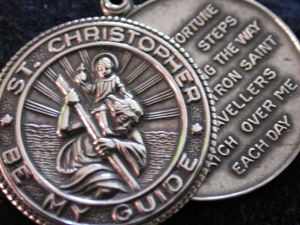Introduction I first encountered the Reformed theology, piety, and practice (c. 1980) in St John’s Reformed Church, in Lincoln, Neb. There were a couple of fairly recent seminary graduates, who had both studied at the Reformed Episcopal seminary in Philadelphia in the . . . Continue reading →
Heidelberg Catechism
Heidelberg 29–30: No Other Name (3): All Or Nothing
Since the garden humans have faced the temptation to listen to an authority claiming to compete with God’s authority. Since the beginning voices have questioned, “has God really said?” Since the beginning voices have raised doubts about whether there is really one . . . Continue reading →
Heidelberg 29: No Other Name (2): Do We Need Salvation?
In part 1 we looked at the problem created by Jesus’ declaration and the Apostolic teaching that the is the only way to the Father. In this part we need to consider another problem: salvation itself. In the Modern(ist) world it is . . . Continue reading →
Heidelberg 29: No Other Name
Jesus is an intentionally troublesome figure. He said “I am the way and the truth and the life. No one comes to the Father except through me” (John 14:6). This was an outrageous claim when it made it and remains so today. . . . Continue reading →
Every Day Is Father’s Day For Christians
Q. 26. What do you believe you when thou say, “I believe in God the Father, Almighty, Maker of heaven and earth”? That the eternal Father of our Lord Jesus Christ, who of nothing made heaven and earth with all that in . . . Continue reading →
Providence (4): Not A Chance In The World
In part 3 we considered the “as it were” principle when thinking and talking about God and his providence. We talk about chance all the time. “Not a chance” or “He never gave me a chance” and in those cases we’re talking . . . Continue reading →
Providence (3): The “As It Were” Principle
In part 2 we considered the biblical and confessional Reformed teaching that the triune God is actively present, sustaining and governing all that is. In our account of the doctrine of providence we use an interesting little expression that is freighted with . . . Continue reading →
Providence: God’s Active, Almighty, Present Power (2)
In the previous post we considered what it means to say “I believe in God the Father almighty. One of the most scurrilous things that some neo-Pentecostalists have alleged against the historic Christian view of God is that we are Deists. Quite . . . Continue reading →
Providence: God’s Active, Almighty, Present, Power (1)
From the moment Adam sought to grasp equality with God (Phil 2), from the moment he mysteriously rebelled against God’s sovereignty and hiddenness (“You shall be as God”), from the moment he ceased to love and adore the triune God, since that . . . Continue reading →
Creator, Sustainer, Father (2)
In the first part we looked at the doctrine of God embedded in Heidelberg Catechism Q/A 26. The catholic (universal) Christian doctrine of God summarized in the catechism is in antithesis to modernist doctrine(s) of God in process or contingent upon us creatures. . . . Continue reading →
Creator, Sustainer, Father (1)
One of the most basic impulses of the Enlightenment and post-Enlightenment west has been to get rid of God. The Enlightenment brought a revolution. In Christian antiquity, God was and we were becoming. In Modernity (and late modernity) we are and God . . . Continue reading →
One God, Three Persons. Full Stop.
The biblical, catholic, Christian doctrine of the Trinity is startlingly brief: God is one in three persons. Yet, the moment we pronounce that little formula, we’ve stepped off the pavement and into deep waters. To those outside the faith, our claim that . . . Continue reading →
The Christian Faith Is Trinitarian
When most people think of the Reformed confession of the Christian faith they probably think about predestination. This is the minimalist definition that is often used. When evangelicals say, “I’m Reformed” what they often mean is, “I’ve adopted the doctrine of election” . . . Continue reading →
The Source of A Variation Of The Apostles’ Creed In Question 23
Most Lord’s Days, in the evening (second) service, the congregation recites the Apostles’ Creed. This is an ancient, biblical practice. The church has been reciting creedal formulae since the Israelites first said the Shema (Deut 6:4): “Hear O Israel, Yahweh Our God, . . . Continue reading →
What Must A Christian Believe?
The questions often arise, “what must a Christian believe to be saved”? or “what are the essentials?” Most often the broad evangelical answer is “not much.” The tendency is toward minimalism in doctrine (belief) and practice. In some circles it is enough . . . Continue reading →
Tour Neustadt With Ursinus
2013 was the 450th anniversary of the publication of the Heidelberg Catechism (1563) but the Heidelpalooza continues. March through July of this year, Michael Landgraf, head of the religious pedagogical center Neustadt, portrays Zacharias Ursinus (1534—83), principal author of the Heidelberg Catechism, . . . Continue reading →
What Is True Faith? (10) A Glorious Omission
In part 9 we considered the role of the gospel in the Spirit’s work of creating new life and granting faith. We saw that there is no tension between the direct, supernatural working of the Spirit and his use of means in . . . Continue reading →
What Is True Faith? (9) Its Gospel Agency
In part 8 we saw that the source of true faith is the sovereign, powerful, re-creating work of the Holy Spirit. Ordinarily, however, he works through what the classic Reformed writers, including Calvin, and the Reformed churches call “the means of grace” . . . Continue reading →
What Is True Faith? (8) Its Source
In part 7 we considered the object of true faith. Ironically, for a culture that is said to be awash in a sea of secularism, faith seems to be pretty popular. George Michael recorded a forgettable song about it in the late . . . Continue reading →
Heidelcast 51: Happy Thanksgiving From The Heidelcast
According to the Heidelberg Catechism there are three great heads of the Christian faith: guilt, grace, and gratitude. There may be other motivations to godliness but the catechism isn’t structured by them. It is structured by gratitude. Yet, there are those who . . . Continue reading →












